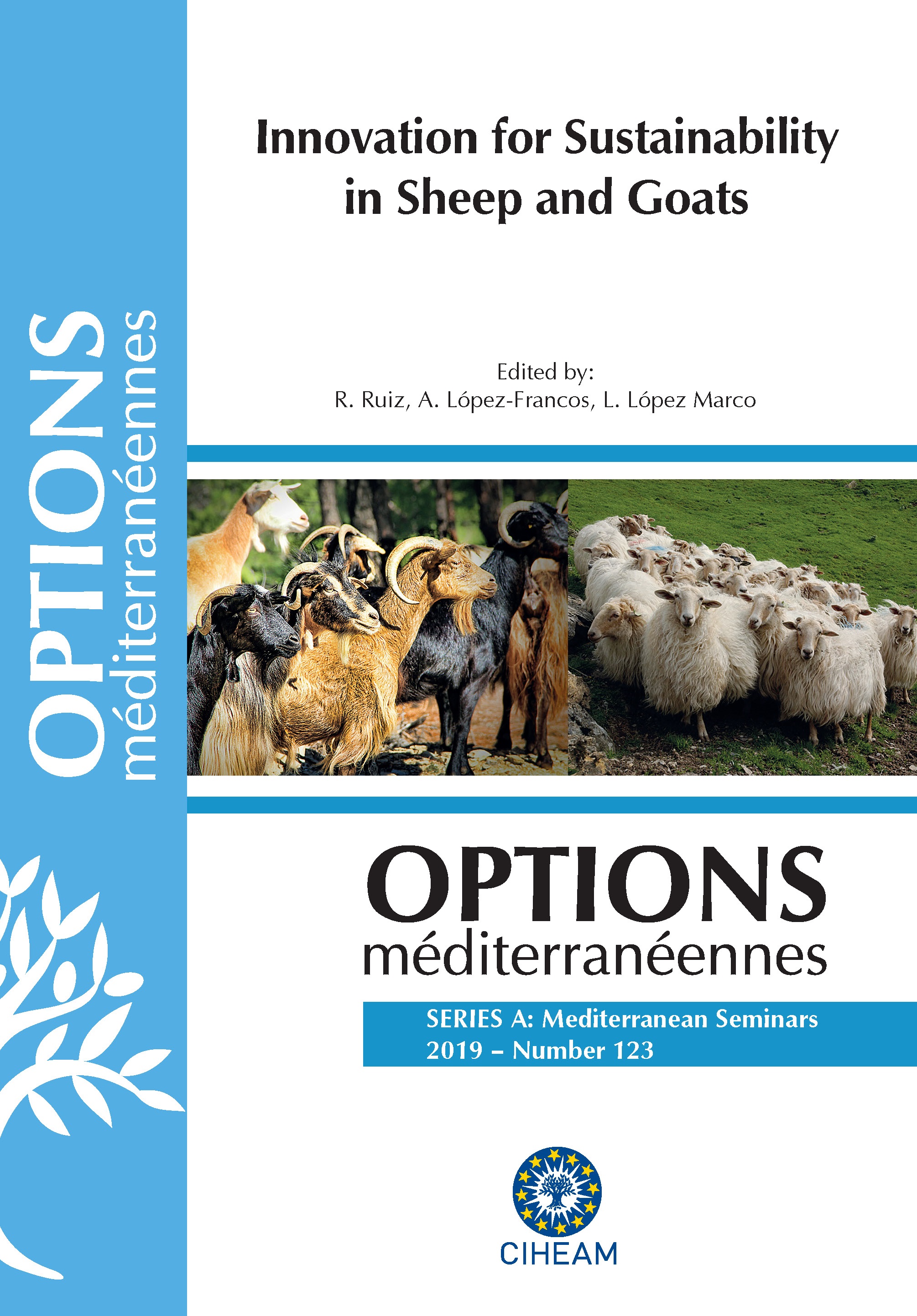| Article précédent | p. 111-116 | Article suivant |
In vitro fermentation of diets including agroindustrial by-products in batch cultures of ruminal microorganisms from goats
In the last years, there has been an increasing interest in the use of alternative feeds, such as agroindustrial by-products, in ruminants feeding. The aim of the present work was to study the effects of including variable amounts of different by-products (tomato fruits, citrus pulp, brewer´s grains and brewer´s yeast), previously processed and dried, in the concentrate of dairy goats on in vitro ruminal fermentation. Six concentrates were formulated and mixed with alfalfa hay in 1:1 proportion before being fermented in vitro using batch cultures of mixed rumen microorganisms from goats. The kinetics of gas production was evaluated in 72-h incubations and the fermentation variables were determined after 24 h incubation. Gas production data were adjusted to the exponential model y = A [1 – e (-c•t)]. There were no differences among diets either on pH (P = 0.091) or molar proportions (P = 0.613 to 0.999) of individual volatile fatty acids (VFA), but total VFA production was greater (P < 0.005) and the amount of CH4 was lower (P < 0.001) in five of the diets including by-products compared with the control diet. The inclusion of by-products resulted in greater values of gas production and gas production rate (P < 0.004 and 0.001, respectively) in four of the diets. The results of this study indicate that by-products from tomato and citrus juice and beer industry could be included in ruminant’s diets, promoting better ruminal fermentation pattern and reducing the environmental impact of animal production. The potential of agro-industrial by-products to substitute conventional ingredients in small ruminant diets should be further investigated.
Au cours des dernières années on a constaté intérêt croissant pour l’utilisation d’aliments alternatifs tels que les sous-produits agro-industriels, dans l’alimentation des ruminants. Le but du présent travail était d’étudier les effets de l’inclusion d’un mélange de sous-produits (fruits de tomate, pulpe d’agrumes, grains et levure de bière), préalablement transformés et séchés dans des fours solaires à convection, dans le concentré des chèvres laitières sur la fermentation ruminale in vitro. Six concentrés ont été formulés et mélangés avec du foin de luzerne en proportion 1: 1 avant d’être fermentés in vitro en utilisant des cultures de micro-organismes provenant du rumen de chèvres. La cinétique de la production de gaz a été évaluée sur la base d’incubations de 72 heures et les variables de fermentation ont été déterminées après 24 h d’incubation. Les données de production de gaz ont été ajustées au modèle exponentiel suivant: y = A [1 – e (-c • t)]. Il n’y avait pas de différence entre les régimes ni sur le pH (P = 0.091) ni sur les proportions molaires (P = 0,613 - 0,999) des acides gras volatils individuels (VFA), mais la production totale d’acides gras voltails (AGV) était plus élevée (P < 0,005) et la quantité de CH4 était plus faible (P < 0,001) dans cinq des régimes incluant les sous-produits par rapport au régime témoin. L’inclusion de sous-produits a entraîné des valeurs plus élevées de la production de gaz (P = 0,004) et des taux de production de gaz (P = 0,001) dans quatre des régimes alimentaires. Les résultats de cette étude indiquent que les sous-produits de l’industrie de la tomate, du jus d’agrumes et de la bière pourraient être inclus dans les régimes alimentaires des ruminants, en ameliorant la fermentation du rumen et en reduisant l’impact environnemental de la production animale. Le potentiel des sous-produits agro-industriels de substituer les ingrédients classiques dans les régimes de petits ruminants devrait être étudié plus en profondeur.
- [ Afficher ]
- [ Télécharger ]
- [ Exporter la citation ]
Vous pouvez télécharger la citation au format :
- [ Imprimer ]
-
Mots-clés
ALIMENT CONCENTRE POUR ANIMAUX, FERMENTATION DU RUMEN, METHANE, PRODUCTION, SOUS-PRODUIT, MICRO-ORGANISME DU RUMENCiter cet article
Romero-Huelva M., Carro M.D., Molina Alcaide E. In vitro fermentation of diets including agroindustrial by-products in batch cultures of ruminal microorganisms from goats. In : Ruiz R. (ed.), López-Francos A. (ed.), López Marco L. (ed.). Innovation for sustainability in sheep and goats. Zaragoza : CIHEAM, 2019. p. 111-116. (Options Méditerranéennes : Série A. Séminaires Méditerranéens; n. 123). 2. Joint Seminar of the Subnetworks on Nutrition and on Production Systems of the FAO-CIHEAM Network for Research and Development in Sheep and Goats, 2017/10/03-05, Vitoria-Gasteiz (Spain). http://om.ciheam.org/om/pdf/a123/00007868.pdf



